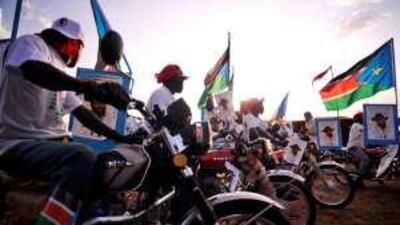JUBA, SUDAN // Sudanese begin voting today in a historic nationwide election that has already been marred by allegations of fraud and a boycott by major opposition parties. The three days of voting for president, legislators and governors in the vast east African country is the first poll in 24 years and is the next step in the peace process that ended one of Africa's longest civil wars in 2005.
The election is taking place amid an ongoing conflict in Sudan's western Darfur region. This week European election observers pulled out of Darfur citing security concerns. The opposition boycott nearly guarantees victory for Omar al Bashir, the incumbent president. Mr Bashir has been indicted by an international court for war crimes allegedly committed in Darfur since the fighting began in 2003. The United Nations says 300,000 people have died in the conflict.
In the past week, the Sudanese People's Liberation Movement (SPLM), a party of former southern rebels that fought the civil war against the north, withdrew its candidate for president and other candidates for local office in northern areas. Other presidential candidates have also boycotted the poll. They claim that the ruling party has already rigged the election in Mr al Bashir's favour, a charge backed up by international observers and analysts.
"The legal environment for free and fair elections does not exist," said Fouad Hikmat, a Sudan adviser with International Crisis Group, a Brussels-based think tank. "The international community should acknowledge that whoever wins will lack legitimacy." The SPLM still planned on contesting legislative and gubernatorial elections in the south and is looking ahead to a referendum on secession next year. The January 2011 referendum is the culmination of the peace deal that ended the civil war that killed two million people.
In the south, the referendum is considered far more important than this week's election and could see the birth of a new African nation. The location of the border still needs to be worked out with Khartoum as well as who would get valuable oilfields that lie in between the north and south. The United States, a key partner in implementing the peace deal, is also shifting focus to the referendum. Donald Payne, a US congressman and chairman of the House subcommittee on Africa, was meeting today with southern Sudanese leaders in Juba, the southern capital.
"This election is a good dry run for the referendum," he said in an interview. Juba was mostly quiet on the day before the election. Campaign posters and billboards are plastered all around the dusty city on the Nile River. Most of the signs, however, are for Salva Kiir, the president of the autonomous government of southern Sudan, who is running for re-election. On the eve of the election, southern Sudanese leaders held a rally where they prayed for a peaceful poll.
"We don't want the kind of election violence that happened in Kenya and in other countries," said Paul Jacob, an official in Juba's information ministry. "We are expecting a peaceful election." On the streets of Juba, some southerners seemed to care little for the much hyped elections. The lingering climate of mistrust between the north and south has taken some of the gravitas out of these polls that some had said would be compared with post-apartheid South African elections in being free and fair.
"I may vote, but it does not matter," said James Akol, a shopkeeper from Juba. "Our real fight will be next year [during the referendum]." The election, at least in the south, will be seen as a test for the much more divisive referendum next year. A whole generation of Sudanese is now unfamiliar with a ballot box. Daniel Deng, the founder of the Deng Foundation, a voter education group, held a rally this week in Juba to raise voter awareness.
"I will be voting for the first time, and I don't think my mum or dad has ever voted in their lives. We have lived in this country like aliens, forgotten. Now we have a chance to be part of something," Mr Deng said, before quickly adding that the independence vote next year was more important. "Let's get it out of the way and then move forward to the referendum," he said. mbrown@thenational.ae
* With additional reporting by the Associated Press

